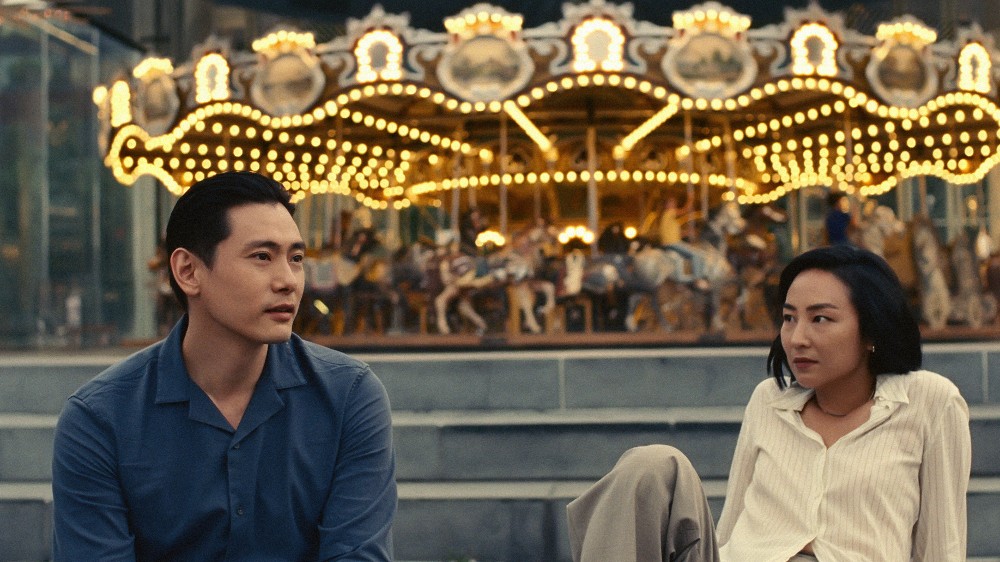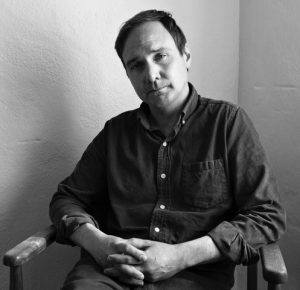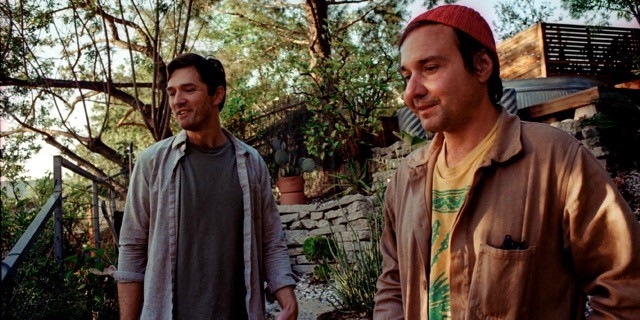
If you watched Celine Song‘s indie drama Past Lives any time since it premiered at the Sundance Film Festival earlier this year, and you thought the music sounded familiar, you’re probably cooler and hipper than you even realized.
The music for Song’s moving film about reuniting with a childhood love was composed by Christopher Bear and Daniel Rossen, one half of the beloved Brooklyn band, Grizzly Bear, which released five amazing albums between 2004 and 2017 before going on an extended hiatus in 2020. The band as a whole previously did the score for Derek Cianfrance‘s Blue Valentine in 2010. Like in that film, the tone and mood for the film is enhanced greatly by their music, which mixes gorgeous melodies and unique instrumentation with ambient mixing techniques.
Below the Line spoke with Bear and Rossen over Zoom a few weeks back for the following conversation about their score for Past Lives.

Below the Line: This is a wonderful score, and I’m glad that A24 is giving it a nice vinyl release. You guys haven’t done a ton of scoring other than Blue Valentine, so how did Celine reach out to you?
Christopher Bear: It was just one of those things that sort of came in, the interest was expressed, and [we] just quickly jumped on reading the script. After that first connecting and sort of feeling out one another and what the project, it just quickly seemed to make sense.
Simultaneously, not really knowing what the thing was going to be until we actually jumped into it, but it felt like a good sort of person-to-person fit in terms of just comfortability with talking about the story and the script, and what she was hoping for. That said, there wasn’t a whole lot of direction in terms of, “I want it to sound exactly like this,” or musical reference points that she was putting up.
BTL: Had she started filming any of it yet, or was this before shooting?
Bear: I think when we first talked, she had shot some stuff, but it was maybe unclear, but I know [that] if nothing had been shot, it was just on the precipice of being shot.
Daniel Rossen: It was quite early.
BTL: After Grizzly Bear… I’m not sure if disbanded is the proper term… but have you two continued to work together since then?
Rossen: Chris and I have continued to work together a bit on a couple projects, since the band stopped touring. I think it was a relatively smooth transition to trying something different. Chris has been doing all kinds of score work since then, too. I think that was probably an obvious match for him.

BTL: Did you guys start writing as soon as you came onto the project after reading the script?
Rossen: Pretty early on, they just started sending us specific scenes that they felt needed some score, and we just took a crack at different ones and tried to see what fit, what made sense, and what didn’t. We had to find the vocabulary between the two of us and between us and Celine, kind of figure out musically, even what it was going to be. We had to try a few scenes first to hone in on just what it was.
A lot of the discussions with Celine were more broad, not really even using a lot of musical terminology. It was broad emotional terms, and how much to convey emotionally and how much to holdback, how much restraint to use and that sort of thing. It took some time to find out what it was going to be.
BTL: But there was no point where she was using any of your former music as temp. You were always supplying original music to her for the edit?
Bear: There was some. We had given her a folder of things that we had done, not specific to the film, that she used for temp in a couple of places. There were some other things that were not us, that were in for a second, but I don’t think there was really a phase where the entire film was temped out with other stuff.
I think the hope was that a.) let’s not get too attached to temp stuff but also, it’s such a treat to be able to build something around something original, and for us to be able to make things that aren’t necessarily reactions to another existing piece of music or whatever. There was a little bit of temp, but it wasn’t a whole realized vision of the film in that way
BTL: How do each of you write? Are you coming up with ideas on your own, then bringing them together? Are you both sitting in a room at a piano or playing guitar?
Bear: I’m in LA and Daniel’s in Santa Fe, New Mexico. We were working in our own spaces, and like Daniel said, we split some things up, some of those initial cues of just, “Why don’t you take a crack at this one? I’ll take a shot at this.” One of us would start an idea and then pass it over, and then see what needed to be added, and add a layer here and there, so it became from both of us, and then back to Celine, and then it would bounce back to us, and we’d figure out how to shape from there. Generally, most of the time I write from piano or keyboard world first. That’s more at home for me. I don’t know for Daniel, it’s maybe different, maybe a combo of that and guitar.
Rossen: Probably a combo, especially [since] scoring is very new for me, and I tend to work very slowly on everything. But with this film, too, it was a lot of just staring at the scene over and over again and trying to find melodies and taking probably way too long. I am not very fluid with a lot of soft synths and computer-related tools, so it’s a lot of recording parts over and over again.
And then the scene would come back and be slightly different than I’d be like, “Oh, God!” I tried to shift things around and shift the arrangement around and trying to apply way too old-fashioned techniques to something that is a little bit more modern. I feel by the end of this experience, I was able to keep up a little more with Chris and make it a little more fluid and functional.
BTL: You don’t have two 8-track reel-to-reels where you’re bouncing stuff back and forth between, I hope. Not that primitive.
Rossen: Oh, no, no, no…
Bear: Yeah, all sent through US Postal Service.

BTL: I’m assuming you did most of this last year when COVID was still present, but the vaccine was rolling out, but were the three ever of you together, even for the mix?
Bear: No, we were not at the mix, so I didn’t meet Celine until after it was all done. She was in New York the whole time. I don’t know, in some way, I don’t feel like there were many moments that felt our location or proximity was a hindrance to making it happen.
BTL: I find that musicians are so used to working at home, that it wasn’t a huge shift due to COVID, but whoever mixed the movie did an amazing job, so did you send them stems or full mixes of your music?
Bear: Yeah, there were stems. I’m actually curious how much they actually worked off the stems or if they worked off mostly the stereo files. Seeing the finished thing does sound pretty much as we had mixed it. I was happy to see how it came out. Especially if you’re not at the mix, you never know how present the score is going to be. So often it can be pretty tucked into the mix, but I felt it was quite upfront for a lot of this film, which I think is cool, because it really allows it to, at times, be a character.
It’s a pretty minimal film in a lot of ways, and maybe it’s not even actually mixed that loud. It’s just in general, there’s enough space that when score is happening, it’s there, and it is serving a supportive purpose, but I think also at times, maybe having a little bit extra character in relation to the film.
BTL: I’ve always thought you used interesting instrumentations, and a lot of what you do in mixing of your records is similarly distinctive and unique. I’m not sure if Celine’s sound mixer mixing from stems would have quite the same touch mixing your music, as you would have just sending them a mix.
Bear: I think for both of us, especially in terms of just the sound, we probably mostly approach the soundmaking and the aesthetic side of things, as we would making a record or something. I think in some ways that maybe that adds a unique feel to how it works within the film context, because it’s not like these are song-songs, but maybe they’re mixed more in a way like you might enjoy on a record or something.
BTL: Daniel, you were one of the vocalists in Grizzly Bear, so working on music that isn’t lyrically driven, is that easier or harder for you? Is there something in your head always trying to think of lyrics for the music you’re writing?
Rossen: No, I will say it’s hard for me to not want to use the voice as a texture, as an instrument. I often try to sneak that in there, even if it doesn’t work, because I’m just so accustomed to it. Especially now, being a bit older, and kind of being done with the mindset of a band, it’s nice to have something else, just an image or someone else’s narrative or someone else’s story to take that center space, and use all the same other skills.
So much of songwriting and making music, I think, for us in the band, it wasn’t purely about writing a lyric and melody and then just plopping in the usual instrumentation. So much of it was about building the instrumentation and working on our own odd aesthetic and building out different kinds of arrangement. I think it transfers over pretty naturally to a version of film work, which we’ve always talked about. It always seemed like something that would be interesting to try, so I’m excited to jump into that.
I will say that Celine’s film – because there are so few parameters to begin with – it definitely lent itself to almost treating the score like we would an album; we’re just developing our own little musical world, and it’s pretty serious. There’s also something nice in film work where you get to try odd challenges, and it pushes you — pushes me anyway — to be a little more playful and try things that are a little outside of my comfort zone. It takes some of that heaviness off, which I think making records, it’s always like, “This really has to be something. It’s gotta be this statement.” When you’re building a musical world around someone else’s vision, you have a little more wiggle room to try something different.

BTL: There are a lot of mallets, winds in the instrumentation here. Since you’re using mallets and winds, is that the two of you playing everything, or are you bringing in other musicians?
Rossen: It was either one or the other of us. Chris does a lot of the mallet stuff and a lot of the synth stuff and percussion and building all that out on the piano. I have some woodwinds, clarinet, and some cello and upright bass and things like that. 12-string, so it’s our combined studio options is what makes up the score really.
BTL: Daniel mentioned wanting to do more of this, so will you try to do more scoring together?
Bear: I wish life had a more concrete plan sometimes, but certainly, doing film work has been a lot of fun, and it feels like a fun way to use a lot of the skills that we’ve cultivated over our time as a band, and our own music that we’ve made. As Daniel said, having someone else serving a larger project or something that’s not just for the pure sake of an album type work, feels very fun and exciting.
Also, just having other people to bounce these ideas off of, I find that really exciting to be collaborating with someone on the other side of things that’s not necessarily a musician. Being able to speak with Celine about direction, not necessarily having it be like gear talk or whatever, it’s more like, “What is this story?” It feels kind of fresh. It still has a lot of novelty, I guess.
BTL: Do either of you perform live, even if it’s just local things and not the typical touring you used to do with the band?
Rossen: I did some solo shows last year, toured around. It’s very taxing. I’m happy at the moment personally to not be doing that. As Chris said, since I live in Santa Fe, it’s a little more difficult to put a band together. Even if I wanted to, it’s hard. And we both have kids, which makes things a little more complicated. Were I in Los Angeles, I would love to figure out some more ensemble playing and play out and do that again. But yeah, I don’t know.
Bear: Well, being here [in L.A.], I sometimes think that actually getting it together or doing it is somehow harder. I do enjoy it still, and I’ve done a couple of things here and there that are more improvised world based that felt really fun. It’s not like, “Oh, I gotta plan and put a group together.” Certainly, it seems pretty far from my mind to necessarily want to go tour, but every now and then I definitely miss that playing in a room feeling that you get from doing shows.
The score for Past Lives is eligible for the Original Score at the Oscars. It’s available to hear on most streaming services, but A24 also has it available on white vinyl.





